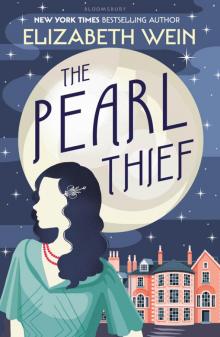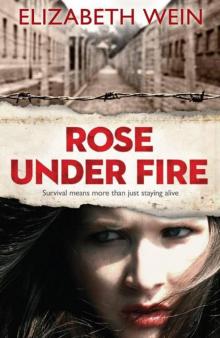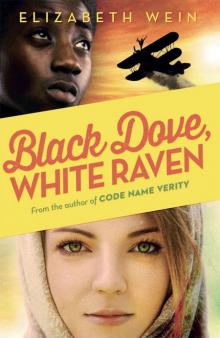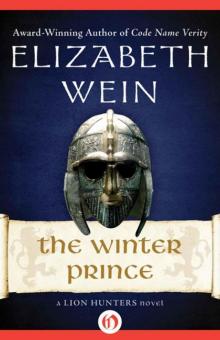- Home
- Elizabeth E. Wein
Code Name Verity Page 9
Code Name Verity Read online
Page 9
Reason had been hammering at Maddie. She’d thought in rapid succession: I shouldn’t leave base, I don’t know what I’m doing, it’s probably illegal, I’ll be court-martialled, and so forth. But now she made up her mind. Reminded how long it had been since she had flown a plane herself, Maddie made up her mind. It had been far too long.
‘Now,’ Maddie said. ‘Now I wear Air Force blue and already this year I’ve been fired on in the air and I’ve shot down an enemy plane myself, or as good as. And Dympna’s my instructor and I’m a pilot and you –’
Queenie needed twisting. She was still on her feet, still clutching her untouched toast.
‘Pretend,’ Maddie told her, inspired – ‘Pretend you’re Jamie. Your favourite brother, the one you worry about, on a training mission. You’re sure and full of yourself. You’ve done your solo in a Tiger Moth, and now you’re going along as a stooge, and all you have to do is raise and lower the undercarriage, which will leave the instructor free to concentrate on the tyro pilot –’
Suddenly she faltered. ‘You’re not really afraid of heights, are you?’
‘A Wallace and a Stuart, feart o’ anythin’?’
Maddie thought it must be like having a little brass peg in your mind, like the hinged switch on an electric hall light, and when you flipped it, you turned instantly into another person. Queenie’s stance was different, her feet slightly further apart and flat on the floor, her shoulders squared back. Perhaps more like a drill sergeant than her Eton-educated older brother, but certainly more man than any WAAF Flight Officer. She cocked her blue cap back at a rakish angle.
‘High time they put the RAF in kilts,’ she remarked, flipping the hem of her uniform skirt disdainfully.
Maddie said a silent, secret thank-you to Adolf Hitler for giving her this utterly daft chameleon for a friend, and chummed Queenie out to the airfield, following Dympna.
The sky was low and grey and wet. ‘You’ll get an hour in your log book, P1 under training,’ Dympna told Maddie over her shoulder as they crossed to the Anson. ‘Taxi, takeoff and a full flight to RAF Branston. I’ll talk you through the landing there, and you can try it yourself when we get back to Maidsend.’
There was a lad (a real one) giving the aircraft the once-over when they reached it, and chatting with a couple of ground crew. He turned out to be Dympna’s other passenger, the other ferry pilot on her taxi run. He glanced up at Dympna as she approached and gave a laugh, and exclaimed in a broad American accent, ‘Well, look what we have here – three gorgeous English gals to fly with!’
‘Yankee idiot!’ cursed the youthful, blue-kilted bomber pilot. ‘I am a Scotsman.’
—
Maddie climbed in first. She crawled forward through the fuselage (ex-civil passenger aircraft, impressed by the RAF like Dympna’s Puss Moth) and into the left-hand seat, the pilot’s seat. Then she sat scanning the collection of gauges and instruments. She was surprised by how many of them were the friendly, familiar faces of dials she knew: rev counter, airspeed indicator, altimeter – and when she took hold of the flight controls and felt the ailerons and elevator responding reliably to her command, for one moment she thought she was going to cry properly. Then she glanced over her shoulder and saw her passengers climbing in behind her. Dympna slid her elegant length into the right-hand seat beside Maddie, and Maddie pulled herself together. On her behalf a random squall peppered the panes of the cockpit with fat raindrops for about ten seconds. Then the shower stopped suddenly, like a squirt of machine-gun fire.
What’s a lass like you need with a big toy like this?
Maddie laughed aloud, and said to Dympna, ‘Run me through the checks.’
‘What’s so funny?’
‘This is the biggest toy ever.’
‘We’ll get bigger ones soon,’ Dympna assured her.
Maddie felt like the last day of school, like the summer holidays beginning.
‘Two fuel tanks in each wing,’ said Dympna. ‘Two oil pressure gauges, two throttle levers. But only one mixture control – set that to normal for start-up. The ground crew takes care of the priming pumps –’ (I am making this up. You get the idea.)
Maddie had taxied this familiar airfield and roared down the rutted runway in her head so many times it felt as though she’d done it before; or as though she were dreaming now. The Anson leaped into the air in a gust of headwind. Maddie fought the aircraft for a while, straightened the rudder, felt the speed increase as Dympna’s laborious cranking of the undercarriage began to progress and the extra drag fell away. The wings lifted and dipped in the blustering wind like a motorboat riding swells. It was lovely flying a low-winged plane, with its unblocked endless view of sky – or, on that occasion, low-hanging cloud.
‘Hey, Scottie!’ Dympna ordered, shouting over the engines. ‘Stop squeaking and give me a hand.’
The skriking Scot crept towards the cockpit, keeping low to the floor of the aircraft to avoid having to look out. Maddie glanced over her shoulder again; she could tell her friend was manfully battling some demon or other.
‘If you’re scared, do something,’ Maddie shouted, not without irony.
The Scot, whey-faced and determined, reached down alongside the pilot’s seat and took hold of the undercarriage crank. ‘My real fear,’ Scottie gasped, giving the crank a turn, ‘is not of heights’ – another turn – ‘but of being sick.’
‘Doing something should help,’ yelled the Yank from the back, enjoying the view ahead of him for different reasons than the rest of them.
‘Looking at the horizon helps,’ yelled Maddie, her own far-seeing eyes focused on the distant place where the battered grey land met tumultuous grey cloud. Conversation was not really possible. Most of Maddie’s being was absorbed in flying the buffeting Anson. But a little corner of her mind was sorrowing that her friend’s first flight was not being made through a still summer evening of golden light over the green Pennines.
Maddie landed the Anson into wind with a wallop, and Dympna kept her hands to herself, letting Maddie do it. The Yank said it was a whale of a landing, which he meant as a compliment. Afterwards the Scot stood quivering on the runway with gritted teeth while the aircraft was refuelled and the Branston ground crew chatted with the ferry pilots. Maddie stood close by, not close enough to touch, not anything so babyish. But offering silent sympathy.
Minus the Yank ferry pilot, the Anson crew set off back to Maidsend. Fitful sunlight, low on the horizon, gleamed through the heavy cloud in the west, and Maddie, rather desperate to improve the experience for her suffering passenger, was able to climb a little higher where the wind was brisker and not so gusty. (The ferry pilots are not allowed to fly higher than 5000 feet. Engel will have to do the metric conversion – sorry about that.)
Blooming crosswind, Maddie swore to herself as they crawled back towards home.
‘Still feeling sick?’ Dympna bellowed at the hapless Scot. ‘Come and sit in the front.’
The Scot, in weakened state, was easily bullied (as you know). Dympna crawled out of her forward seat and Scottie crawled into it.
Maddie glanced at her friend, grinned and took hold of the finely manicured hand that gripped the edge of the copilot’s seat. She forced the hand round the flight controls.
‘Hold this,’ she bellowed. ‘See how we’re slant against the sun? ’Cause there’s a whopper of a crosswind, so we have to crab. Just like sailing. You point the plane sideways. Got it?’
Scottie nodded, face pale, jaw set, eyes alight.
‘See?’ Maddie held her own empty hands aloft. ‘You’re in control. You’re flying the plane. The Flying Scotsman!’
The Flying Scotsman squeaked again.
‘Don’t cling to it – just hold it gently – oh, well done.’
They beamed at each other for a moment. Then they looked back at the sky.
‘Dympna!’ cried Maddie. ‘Look, look at the sun!’
It was green.
God’s truth – the rim of the
lowering sun, all they could see of it, had turned green. It was sandwiched in between a bank of low dark haze and a higher bank of dark cloud, and just along the upper edge of the haze was this bright lozenge of flaming green, like Chartreuse liqueur with light behind it. Maddie had never seen anything like it.
‘My God –’ Dympna whispered something to this effect, but no one heard her. She laid a hand on each girl’s shoulder, gripping them hard.
‘Fly the plane, Maddie,’ she commanded hoarsely, an instructor’s reminder.
‘I am.’
Maddie flew the plane, but she stared at the sun’s green edge too, for a long, wind-buffeted, glorious half a minute. Thirty seconds it lasted, green sunlight breaking the cloud on the horizon. Then the light winked out below the haze again and all three pilots were left blinded in the dull gloom of a showery autumn afternoon.
‘What was it? Dympna, what was it? A test? A new bomb? What –’
Dympna relaxed her grip on their shoulders.
‘It’s called the Green Flash,’ she said. ‘It’s just a mirage, a trick of the light. Nothing to do with the war.’ She let out a little gasp of delight. ‘Oh! My father saw it once when he was camping on Kilimanjaro, years ago. Get to work, Scottie, undercarriage needs lowering. And I need the instructor’s seat back to make sure Brodatt lands us safely.’
—
Down on earth, Dympna tossed out the two tyros and took off again without herself setting foot on the ground at Maidsend, hurrying back to her own base before it got dark or the weather closed in (ATA pilots are able to authorise their own flights).
Queenie, herself again, took hold of Maddie’s hand and squeezed it tightly. She walked all the way back across the airfield without letting it go. Maddie closed her eyes and flew again in the ethereal, pale green light. She knew she would never let it go.
—
I’m sorry. This has got absolutely bugger all to do with Air Taxi.
But it was that flight that shoehorned Maddie into the ATA. She was released to them by the WAAF, not seconded – a somewhat unusual procedure then, though they did more of it later in the war – unusual because the ATA is a civilian organisation and the WAAF military. But Maddie had been on the ATA’s waiting list since it was drawn up, and having Dympna on her side put her at an advantage over other applicants who might have been equally qualified. The women on the waiting list were all far more qualified than the men because the qualified men didn’t have to wait. Also, Maddie’s Oakway night flying and fog line landings made her a bit special (night and fog, brrrr, even innocently and in English it makes me shiver). Lads with her experience were flying bombers now. The ATA needed her.
They fly without radio or navigation aids. They do have maps, but they are not allowed to mark balloons or new airfields on them, in case they lose the maps and you lot pick them up. Maddie did a training course when she joined, early in 1941, and she had one instructor who told her: ‘You don’t need a map. Just fly this heading for as long as it takes to smoke two cigarettes. Then turn and fly the next heading for another cigarette.’ You can fly hands-free and light a fag mid-flight pretty easily if the aircraft is set up properly – FDF, Fag Direction Finding.
About the same time Maddie joined the Air Transport Auxiliary, her friend the wireless operator was seconded to the SOE, the Special Operations Executive. Maddie did not know this. They’d been swapping letters for a while after Maddie left Maidsend, and then suddenly Queenie’s letters started arriving from an undisclosed address and were full of black censor’s marks, as though they were coming from a soldier in North Africa. And then Queenie asked her to write to her at home, which had the impressively simple (and palindromic!) address of Craig Castle, Castle Craig (Aberdeenshire). But she was not at home. That was just for forwarding purposes. So they did not see each other most of that year except:
1) When Queenie turned up unexpectedly during a break in the Manchester Blitz, and they spent three wet and stormy days burning black market petrol up and down the Pennines on Maddie’s Silent Superb.
2) When one of Queenie’s Top Ten Fears materialised and her favourite brother Jamie the bomber pilot (the real Jamie) and his crew got shot down. Jamie spent a night floating in the North Sea and afterwards had to have four frozen fingers and all his toes amputated. Maddie went to visit him when he was in hospital. In fact she had never met him before, and perhaps that wasn’t the best time to meet him, but Queenie actually sent Maddie a telegram – only the second telegram she’d ever got – asking Maddie to come along with Queenie to see him, and Maddie did. It was perhaps not the best time to meet Queenie either.
3) When Queenie was sent up to Oakway for parachute training. And they weren’t allowed to talk to each other that time.
That should be a separate section, ‘SOE Parachute Drops’. But I have not got to that bit yet and now von Linden is just arriving, and I will have to translate what I have written today for him myself, since Engel is not here.
—
I am alone. O God. I have tried to undo Thibaut’s knots, but I can’t reach them with both hands. I was translating today’s writing for von Linden, my elbows on the table and my head between my hands, not daring to look at him. I’d already asked him for more time and he’d said he would consider it after he’d heard today’s material. And I know I have given him nothing today. Nothing but the events of the past two weeks, which he already knows, and the Green Flash. Almighty Christ. After I’d got to the bit about the cook feeling me up – so embarrassing, but if I’d skipped it and v.L. found out later I’d pay for it in blood – he came over and stood by me. I had to look up. When I did, he took a handful of my hair and held it lightly off the back of my neck for a moment.
He never smiles or frowns or anything. I could feel my face flaming. Oh why did I have to put down that coarse, filthy sarcasm about choosing between the cook and the inquisitor? I could not tell what he was thinking. He rubbed my hair gently between his fingers.
Then he said one word. It sounds the same in English and French and German. Kerosene.
And he left me here with the door closed.
I would like to write something heroic and inspired before I go up in fireworks, but I am too stupid and sick with dread to think of anything. I can’t even think of anyone else’s memorable defiance to repeat. I wonder what William Wallace said when they were tying him to the horses that would rip him into quarters. All I can think of is Nelson saying ‘Kiss me, Hardy.’
Ormaie 17.XI.43 JB-S
They have WASHED MY HAIR. That was what the kerosene was for this time. FLAMING HEAD LICE. Now I stink of explosive, but I have not got nits.
Just after the Hauptsturmführer left me last night, there was an air raid and everybody scrambled to the shelters as usual. I sat weeping and waiting for two hours, just as I did sometimes during that week of interrogation, begging God and the RAF for a direct hit that they NEVER DELIVER. After it was over, no one came back for another hour. THREE HOURS without anyone telling me what was going on. I expect v.L. was hoping that in my panic I would write something more productive as a last resort, only I struggled so much trying to get my legs free that the chair I was tied to fell over. Needless to say I could not write in such a state (and did not even consider calling for help). Eventually a number of people came in and found me doing a frantic imitation of an upside-down tortoise.
I had managed to drag myself and my chair over to the door and prepared an ambush that sent two guards sailing head over heels as they tripped on me when they came in. Von Linden really should know me well enough by now to realise that I am not going to face my execution without a fight. Or with anything remotely resembling dignity.
When they had got me resurrected and pulled up to the table again, von Linden came in and laid a single white pill in front of me. Like Alice I was suspicious. I still thought I was about to be executed, you see.
‘Cyanide?’ I asked tearfully. It would be such a humane way to go.
But it
was not a suicide tablet, it turns out. It was an aspirin.
Like Engel, he does pay attention.
He has given me another week. But he has doubled my workload. We made a deal. Another one. Truly I thought I couldn’t possibly have anything left of my soul to sell to him, but we have managed to strike another bargain. He has got a tame American radio announcer who does Nazi propaganda in English aimed at the Yanks – she works from Paris for Berlin’s broadcasting service, and she has been badgering the Ormaie Gestapo for an interview. She wants to give her American battleship audiences a sugarcoated, inside perspective on Occupied France, how well prisoners are treated, how stupid and dangerous it is that the Allies force innocent girls like me to do dirty work like mine, blah blah blah. Despite her shining, legitimate, Third Reich radio credentials the Ormaie Gestapo are reluctant to respond, but von Linden believes he can use me to make a good impression. ‘I would not be here if my own government were not so ruthlessly inhumane,’ I will tell her for him. ‘By contrast see how humanely the Germans deal with captured agents, see how I am doing translation work, neutrally occupying myself while I await trial.’ (A joke – they will not give me a trial.)
(After my second escape attempt, while they were waiting for von Linden to turn up and pronounce punishment, a couple of his stupid subordinates casually blabbed a great many administrative secrets in front of me, not realising I understand German. So I know a lot more about their plans for me than I’m supposed to know. I fall under a sickening policy called Nacht und Nebel, Night and Fog, which allows them to do whatever the hell they feel like to people suspected to be ‘endangering security’, and then make them disappear – really disappear. They don’t execute them here, they ship them off without leaving a trace, into the ‘night and fog’. Oh God – I am a Night and Fog prisoner. It is so secret they don’t even write it down – just use the initials NN. If this manuscript survives me they will probably black out everything I’ve just written. It is not really Nacht und Nebel policy to grant interviews for radio broadcasts, but these Gestapo are opportunists if nothing else. They can always chop me into bits afterwards and bury the scraps in the cellar.)

 The Pearl Thief
The Pearl Thief Cobalt Squadron
Cobalt Squadron The Empty Kingdom
The Empty Kingdom Code Name Verity
Code Name Verity Rose Under Fire
Rose Under Fire A Coalition of Lions
A Coalition of Lions Black Dove, White Raven
Black Dove, White Raven The Winter Prince
The Winter Prince The Sunbird
The Sunbird